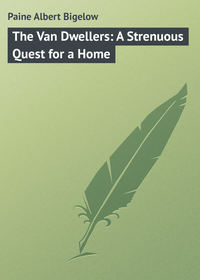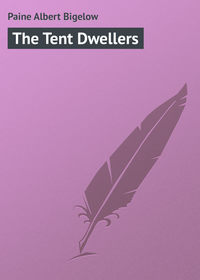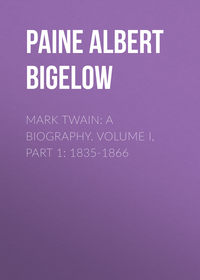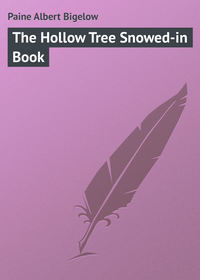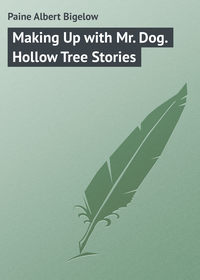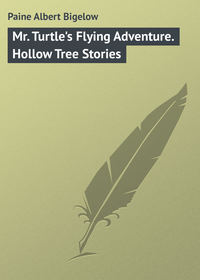
Mark Twain: A Biography. Volume II, Part 2: 1886-1900
Sincerely yours,
S. L. CLEMENS.Scarcely was this note on its way to Wilberforce when the following one arrived, having crossed it in transit:
July 3, 1899.
DEAR MR. CLEMENS,—I have been conscious of a vivacity and facility of expression this afternoon beyond the normal and I have just discovered the reason!! I have seen the historic signature "Mark Twain" in my hat!! Doubtless you have been suffering from a corresponding dullness & have wondered why. I departed precipitately, the hat stood on my umbrella and was a new Lincoln & Bennett—it fitted me exactly and I did not discover the mistake till I got in this afternoon. Please forgive me. If you should be passing this way to-morrow will you look in and change hats? or shall I send it to the hotel?
I am, very sincerely yrs., 20 Dean's Yard. BASIL WILBERFORCE.Clemens was demanded by all the bohemian clubs, the White Friars, the Vagabonds, the Savage, the Beefsteak, and the Authors. He spoke to them, and those "Mark Twain Evenings" have become historic occasions in each of the several institutions that gave him welcome. At the Vagabonds he told them the watermelon story, and at the White Friars he reviewed the old days when he had been elected to that society; "days," he said, "when all Londoners were talking about nothing else than that they had discovered Livingstone, and that the lost Sir Roger Tichborne had been found and they were trying him for it."
At the Savage Club, too, he recalled old times and old friends, and particularly that first London visit, his days in the club twenty-seven years before.
"I was 6 feet 4 in those days," he said. "Now I am 5 feet 8 1/2 and daily diminishing in altitude, and the shrinkage of my principles goes on . . . . Irving was here then, is here now. Stanley is here, and Joe Hatton, but Charles Reade is gone and Tom Hood and Harry Lee and Canon Kingsley. In those days you could have carried Kipling around in a lunch-basket; now he fills the world. I was young and foolish then; now I am old and foolisher."
At the Authors Club he paid a special tribute to Rudyard Kipling, whose dangerous illness in New York City and whose daughter's death had aroused the anxiety and sympathy of the entire American nation. It had done much to bring England and America closer together, Clemens said. Then he added that he had been engaged the past eight days compiling a pun and had brought it there to lay at their feet, not to ask for their indulgence, but for their applause. It was this:
"Since England and America have been joined in Kipling, may they not be severed in Twain."
Hundreds of puns had been made on his pen-name, but this was probably his first and only attempt, and it still remains the best.
They arrived in Sweden early in July and remained until October. Jean was certainly benefited by the Kellgren treatment, and they had for a time the greatest hopes of her complete recovery. Clemens became enthusiastic over osteopathy, and wrote eloquently to every one, urging each to try the great new curative which was certain to restore universal health. He wrote long articles on Kellgren and his science, largely justified, no doubt, for certainly miraculous benefits were recorded; though Clemens was not likely to underestimate a thing which appealed to both his imagination and his reason. Writing to Twichell he concluded, with his customary optimism over any new benefit:
Ten years hence no sane man will call a doctor except when the knife must be used—& such cases will be rare. The educated physician will himself be an osteopath. Dave will become one after he has finished his medical training. Young Harmony ought to become one now. I do not believe there is any difference between Kellgren's science and osteopathy; but I am sending to America to find out. I want osteopathy to prosper; it is common sense & scientific, & cures a wider range of ailments than the doctor's methods can reach.
Twichell was traveling in Europe that summer, and wrote from Switzerland:
I seemed ever and anon to see you and me swinging along those glorious Alpine woods, staring at the new unfoldings of splendor that every turn brought into view-talking, talking, endlessly talking the days through-days forever memorable to me. That was twenty-one years ago; think of it! We were youngsters then, Mark, and how keen our relish of everything was! Well, I can enjoy myself now; but not with that zest and rapture. Oh, a lot of items of our tramp travel in 1878 that I had long forgotten came back to me as we sped through that enchanted region, and if I wasn't on duty with Venice I'd stop and set down some of them, but Venice must be attended to. For one thing, there is Howells's book to be read at such intervals as can be snatched from the quick-time march on which our rustling leader keeps us. However, in Venice so far we want to be gazing pretty steadily from morning till night, and by the grace of the gondola we can do it without exhaustion. Really I am drunk with Venice.
But Clemens was full of Sweden. The skies there and the sunsets be thought surpassed any he had ever known. On an evening in September he wrote:
DEAR JOE,—I've no business in here-I ought to be outside. I shall never see another sunset to begin with it this side of heaven. Venice? land, what a poor interest that is! This is the place to be. I have seen about 60 sunsets here; & a good 40 of them were away & beyond anything I had ever imagined before for dainty & exquisite & marvelous beauty & infinite change & variety. America? Italy? the tropics? They have no notion of what a sunset ought to be. And this one—this unspeakable wonder! It discounts all the rest. It brings the tears, it is so unutterably beautiful.
Clemens read a book during his stay in Sweden which interested him deeply. It was the Open Question, by Elizabeth Robbins—a fine study of life's sterner aspects. When he had finished he was moved to write the author this encouraging word:
DEAR MISS ROBBINS,—A relative of Matthew Arnold lent us your 'Open Question' the other day, and Mrs. Clemens and I are in your debt. I am not able to put in words my feeling about the book—my admiration of its depth and truth and wisdom and courage, and the fine and great literary art and grace of the setting. At your age you cannot have lived the half of the things that are in the book, nor personally penetrated to the deeps it deals in, nor covered its wide horizons with your very own vision—and so, what is your secret? how have you written this miracle? Perhaps one must concede that genius has no youth, but starts with the ripeness of age and old experience.
Well, in any case, I am grateful to you. I have not been so enriched by a book for many years, nor so enchanted by one. I seem to be using strong language; still, I have weighed it.
Sincerely yours,
S. L. CLEMENS.CCVII
30, WELLINGTON COURT
Clemens himself took the Kellgren treatment and received a good deal of benefit.
"I have come back in sound condition and braced for work," he wrote MacAlister, upon his return to London. "A long, steady, faithful siege of it, and I begin now in five minutes."
They had settled in a small apartment at 30, Wellington Court, Albert Gate, where they could be near the London branch of the Kellgren institution, and he had a workroom with Chatto & Windus, his publishers. His work, however, was mainly writing speeches, for he was entertained constantly, and it seemed impossible for him to escape. His note-book became a mere jumble of engagements. He did write an article or a story now and then, one of which, "My First Lie, and How I Got Out of It," was made the important Christmas feature of the 'New York Sunday World.' —[Now included in the Hadleyburg volume; "Complete Works."]
Another article of this time was the "St. Joan of Arc," which several years later appeared in Harper's Magazine. This article was originally written as the Introduction of the English translation of the official record of the trials and rehabilitation of Joan, then about to be elaborately issued. Clemens was greatly pleased at being invited to prepare the Introduction of this important volume, but a smug person with pedagogic proclivities was in charge of the copy and proceeded to edit Mark Twain's manuscript; to alter its phrasing to conform to his own ideas of the Queen's English. Then he had it all nicely typewritten, and returned it to show how much he had improved it, and to receive thanks and compliments. He did not receive any thanks. Clemens recorded a few of the remarks that he made when he saw his edited manuscript:
I will not deny that my feelings rose to 104 in the shade. "The idea! That this long-eared animal this literary kangaroo this illiterate hostler with his skull full of axle-grease—this….." But I stopped there, for this was not the Christian spirit.
His would-be editor received a prompt order to return the manuscript, after which Clemens wrote a letter, some of which will go very well here.
DEAR MR. X.,—I have examined the first page of my amended Introduction,—& will begin now & jot down some notes upon your corrections. If I find any changes which shall not seem to me to be improvements I will point out my reasons for thinking so. In this way I may chance to be helpful to you, & thus profit you perhaps as much as you have desired to profit me.
First Paragraph. "Jeanne d'Arc." This is rather cheaply pedantic, & is not in very good taste. Joan is not known by that name among plain people of our race & tongue. I notice that the name of the Deity occurs several times in the brief instalment of the Trials which you have favored me with. To be consistent, it will be necessary that you strike out "God" & put in "Dieu." Do not neglect this.
Second Paragraph. Now you have begun on my punctuation. Don't you realize that you ought not to intrude your help in a delicate art like that with your limitations? And do you think that you have added just the right smear of polish to the closing clause of the sentence?
Third Paragraph. Ditto.
Fourth Paragraph. Your word "directly" is misleading; it could be construed to mean "at once." Plain clarity is better than ornate obscurity. I note your sensitive marginal remark: "Rather unkind to French feelings—referring to Moscow." Indeed I have not been concerning myself about French feelings, but only about stating the facts. I have said several uncourteous things about the French —calling them a "nation of ingrates" in one place—but you have been so busy editing commas & semicolons that you overlooked them & failed to get scared at them. The next paragraph ends with a slur at the French, but I have reasons for thinking you mistook it for a compliment. It is discouraging to try to penetrate a mind like yours. You ought to get it out & dance on it.
That would take some of the rigidity out of it. And you ought to use it sometimes; that would help. If you had done this every now & then along through life it would not have petrified.
Fifth Paragraph. Thus far I regard this as your masterpiece! You are really perfect in the great art of reducing simple & dignified speech to clumsy & vapid commonplace.
Sixth Paragraph. You have a singularly fine & aristocratic disrespect for homely & unpretending English. Every time I use "go back" you get out your polisher & slick it up to "return." "Return" is suited only to the drawing-room—it is ducal, & says itself with a simper & a smirk.
Seventh Paragraph. "Permission" is ducal. Ducal and affected. "Her" great days were not "over," they were only half over. Didn't you know that? Haven't you read anything at all about Joan of Arc? The truth is you do not pay any attention; I told you on my very first page that the public part of her career lasted two years, & you have forgotten it already. You really must get your mind out and have it repaired; you see yourself that it is all caked together.
Eighth Paragraph. She "rode away to assault & capture a stronghold." Very well; but you do not tell us whether she succeeded or not. You should not worry the reader with uncertainties like that. I will remind you once more that clarity is a good thing in literature. An apprentice cannot do better than keep this useful rule in mind.
Ninth Paragraph. "Known" history. That word has a polish which is too indelicate for me; there doesn't seem to be any sense in it. This would have surprised me last week.
"Breaking a lance" is a knightly & sumptuous phrase, & I honor it for its hoary age & for the faithful service it has done in the prize-composition of the school-girl, but I have ceased from employing it since I got my puberty, & must solemnly object to fathering it here. And, besides, it makes me hint that I have broken one of those things before in honor of the Maid, an intimation not justified by the facts. I did not break any lances or other furniture; I only wrote a book about her.
Truly yours,
MARK TWAIN.It cost me something to restrain myself and say these smooth & half- flattering things of this immeasurable idiot, but I did it, & have never regretted it. For it is higher & nobler to be kind to even a shad like him than just . . . . I could have said hundreds of unpleasant things about this tadpole, but I did not even feel them.
Yet, in the end, he seems not to have sent the letter. Writing it had served every purpose.
An important publishing event of 1899 was the issue by the American Publishing Company of Mark Twain's "Complete Works in Uniform Edition." Clemens had looked forward to the day when this should be done, perhaps feeling that an assembling of his literary family in symmetrical dress constituted a sort of official recognition of his authorship. Brander Matthews was selected to write the Introduction and prepared a fine "Biographical Criticism," which pleased Clemens, though perhaps he did not entirely agree with its views. Himself of a different cast of mind, he nevertheless admired Matthews.
Writing to Twichell he said:
When you say, "I like Brander Matthews, he impresses me as a man of parts & power," I back you, right up to the hub—I feel the same way. And when you say he has earned your gratitude for cuffing me for my crimes against the Leather-stockings & the Vicar I ain't making any objection. Dern your gratitude!
His article is as sound as a nut. Brander knows literature & loves it; he can talk about it & keep his temper; he can state his case so lucidly & so fairly & so forcibly that you have to agree with him even when you don't agree with him; & he can discover & praise such merits as a book has even when they are merely half a dozen diamonds scattered through an acre of mud. And so he has a right to be a critic.
To detail just the opposite of the above invoice is to describe me. I haven't any right to criticize books, & I don't do it except when I hate them. I often want to criticize Jane Austen, but her books madden me so that I can't conceal my frenzy from the reader; & therefore I have to stop every time I begin.'—[Once at a dinner given to Matthews, Mark Twain made a speech which consisted almost entirely of intonations of the name "Brander Matthews" to express various shades of human emotion. It would be hopeless, of course, to attempt to convey in print any idea of this effort, which, by those who heard it, is said to have been a masterpiece of vocalization.]
Clemens also introduced the "Uniform Edition" with an Author's Preface, the jurisdiction of which, he said, was "restricted to furnishing reasons for the publication of the collection as a whole."
This is not easy to do. Aside from the ordinary commercial reasons I find none that I can offer with dignity: I cannot say without immodesty that the books have merit; I cannot say without immodesty that the public want a "Uniform Edition"; I cannot say without immodesty that a "Uniform Edition" will turn the nation toward high ideals & elevated thought; I cannot say without immodesty that a "Uniform Edition" will eradicate crime, though I think it will. I find no reason that I can offer without immodesty except the rather poor one that I should like to see a "Uniform Edition" myself. It is nothing; a cat could say it about her kittens. Still, I believe I will stand upon that. I have to have a Preface & a reason, by law of custom, & the reason which I am putting forward is at least without offense.
CCVIII
MARK TWAIN AND THE WARS
English troubles in South Africa came to a head that autumn. On the day when England's ultimatum to the Boers expired Clemens wrote:
LONDON, 3.07 P.m., Wednesday, October 11, 1899. The time is up! Without a doubt the first shot in the war is being fired to-day in South Africa at this moment. Some man had to be the first to fall; he has fallen. Whose heart is broken by this murder? For, be he Boer or be he Briton, it is murder, & England committed it by the hand of Chamberlain & the Cabinet, the lackeys of Cecil Rhodes & his Forty Thieves, the South Africa Company.
Mark Twain would naturally sympathize with the Boer—the weaker side, the man defending his home. He knew that for the sake of human progress England must conquer and must be upheld, but his heart was all the other way. In January, 1900, he wrote a characteristic letter to Twichell, which conveys pretty conclusively his sentiments concerning the two wars then in progress.
DEAR JOE,—Apparently we are not proposing to set the Filipinos free & give their islands to them; & apparently we are not proposing to hang the priests & confiscate their property. If these things are so the war out there has no interest for me.
I have just been examining Chapter LXX of Following the Equator to see if the Boer's old military effectiveness is holding out. It reads curiously as if it had been written about the present war.
I believe that in the next chapter my notion of the Boer was rightly conceived. He is popularly called uncivilized; I do not know why. Happiness, food, shelter, clothing, wholesome labor, modest & rational ambitions, honesty, kindliness, hospitality, love of freedom & limitless courage to fight for it, composure & fortitude in time of disaster, patience in time of hardship & privation, absence of noise & brag in time of victory, contentment with humble & peaceful life void of insane excitements—if there is a higher & better form of civilization than this I am not aware of it & do not know where to look for it. I suppose that we have the habit of imagining that a lot of artistic & intellectual & other artificialities must be added or it isn't complete. We & the English have these latter; but as we lack the great bulk of those others I think the Boer civilization is the best of the two. My idea of our civilization is that it is a shoddy, poor thing & full of cruelties, vanities, arrogancies, meannesses, & hypocrisies.
Provided we could get something better in the place of it. But that is not possible perhaps. Poor as it is, it is better than real savagery, therefore we must stand by it, extend it, & (in public) praise it. And so we must not utter any hurtful word about England in these days, nor fail to hope that she will win in this war, for her defeat & fall would be an irremediable disaster for the mangy human race. Naturally, then, I am for England; but she is profoundly in the wrong, Joe, & no (instructed) Englishman doubts it. At least that is my belief.
Writing to Howells somewhat later, he calls the conflict in South Africa, a "sordid and criminal war," and says that every day he is writing (in his head) bitter magazine articles against it.
But I have to stop with that. Even if wrong—& she is wrong England must be upheld. He is an enemy of the human race who shall speak against her now. Why was the human race created? Or at least why wasn't something creditable created in place of it? . . . I talk the war with both sides—always waiting until the other man introduces the topic. Then I say, "My head is with the Briton, but my heart & such rags of morals as I have are with the Boer—now we will talk, unembarrassed and without prejudice." And so we discuss & have no trouble.
I notice that God is on both sides in this war; thus history repeats itself. But I am the only person who has noticed this; everybody here thinks He is playing the game for this side, & for this side only.
Clemens wrote one article for anonymous publication in the Times. But when the manuscript was ready to mail in an envelope stamped and addressed to Moberly Bell—he reconsidered and withheld it. It still lies in the envelope with the accompanying letter, which says:
Don't give me away, whether you print it or not. But I think you ought to print it and get up a squabble, for the weather is just suitable.
CCIX
PLASMON, AND A NEW MAGAZINE
Clemens was not wholly wedded to osteopathy. The financial interest which he had taken in the new milk albumen, "a food for invalids," tended to divide his faith and make him uncertain as to which was to be the chief panacea for all ills—osteopathy or plasmon.
MacAlister, who was deeply interested in the plasmon fortunes, was anxious to get the product adopted by the army. He believed, if he could get an interview with the Medical Director-General, he could convince him of its merits. Discussing the matter with Clemens, the latter said:
"MacAlister, you are going at it from the wrong end. You can't go direct to that man, a perfect stranger, and convince him of anything. Who is his nearest friend?"
MacAlister knew a man on terms of social intimacy with the official.
Clemens said, "That is the man to speak to the Director-General."
"But I don't know him, either," said MacAlister.
"Very good. Do you know any one who does know him?"
"Yes, I know his most intimate friend."
"Then he is the man for you to approach. Convince him that plasmon is what the army needs, that the military hospitals are suffering for it.
Let him understand that what you want is to get this to the Director-General, and in due time it will get to him in the proper way.
You'll see."
This proved to be a true prophecy. It was only a little while until the British army had experimented with plasmon and adopted it. MacAlister reported the success of the scheme to Clemens, and out of it grew the story entitled, "Two Little Tales," published in November of the following year (1901) in the Century Magazine. Perhaps the reader will remember that in the "Two Little Tales" the Emperor is very ill and the lowest of all his subjects knows a certain remedy, but he cannot seek the Emperor direct, so he wisely approaches him through a series of progressive stages—finally reaching and curing his stricken Majesty.
Clemens had the courage of his investments. He adopted plasmon as his own daily food, and induced various members of the family to take it in its more palatable forms, one of these being a preparation of chocolate. He kept the reading-table by his bed well stocked with a variety of the products and invited various callers to try a complimentary sample lot. It was really an excellent and harmless diet, and both the company and its patients would seem to have prospered—perhaps are prospering still.
There was another business opportunity came along just at this time. S. S. McClure was in England with a proposition for starting a new magazine whose complexion was to be peculiarly American, with Mark Twain as its editor. The magazine was to be called 'The Universal', and by the proposition Clemens was to receive a tenth interest in it for his first year's work, and an added twentieth interest for each of the two succeeding years, with a guarantee that his shares should not earn him less than five thousand dollars the first year, with a proportionate increase as his holdings grew.
The scheme appealed to Clemens, it being understood in the beginning that he was to give very little time to the work, with the privilege of doing it at his home, wherever that might happen to be. He wrote of the matter to Mr. Rogers, explaining in detail, and Rogers replied, approving the plan. Mr. Rogers said he knew that he [Rogers] would have to do most of the work in editing the magazine, and further added:
One thing I shall insist upon, however, if I have anything to do with the matter, and it is this: that when you have made up your mind on the subject you will stick to it. I have not found in your composition that element of stubbornness which is a constant source of embarrassment to me in all friendly and social ways, but which, when applied to certain lines of business, brings in the dollar and fifty-cent pieces. If you accept the position, of course that means that you have to come to this country. If you do, the yachting will be a success.


